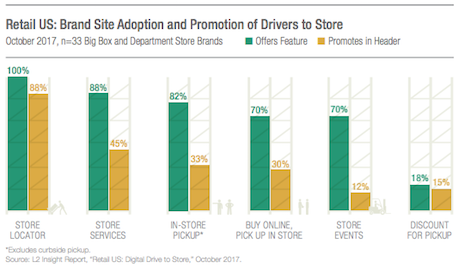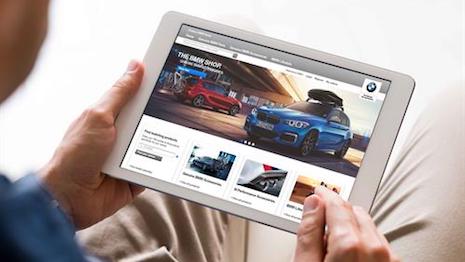Multichannel retail does more than just improve the customer experience, it also causes consumers to spend more if they engage with a brand or retailer on both a digital and physical level.
According to new research from L2, the average omnichannel shopper visits a physical store more often and spends more while there than a non-omnichannel shopper. This data point shows that connecting with customers on multiple levels is one of the most important things the modern retailer can do to improve sales.
Multichannel retail
It has long been known that multichannel is one of the biggest trends in retail at the moment. Understanding how to get customers engaged on every channel is a holy grail for retailers.
New research from L2 points out some of the benefits of effective multichannel retail, which goes beyond just bringing in more customers.
For one, having a robust multichannel strategy means that shoppers who engage on multiple channels come to the store more often and spend more money in-store than customers who are solely offline shoppers. L2 found that the average multichannel shopper spends 4 percent more per visit and comes into a store 23 percent more often.

Brand site adoption. Image credit: L2
L2 points to the high number of brands and retailers that have adopted smart multichannel options such as in-store pickup for online orders and promoting in-store events online at 80 and 70 percent adoption rates, respectively.
However, L2 found that fewer retailers are doing a sufficient job of advertising these features, leading fewer customers to even be aware of their existence.
Only 40 percent of brands that offer in-store pick up advertise it adequately on their Web sites. Similarly, only 18 percent of brands offer discounts to customers who opt for in-store pickup, a valuable technique that more brands and retailers should employ.
Valued customers
The importance of omnichannel retail can be seen just from surveying some of the brands and stores that have adopted it in recent years.
For example, French department store chain Galeries Lafayette is inaugurating a new experience-led store concept at the Carré Sénart shopping center in the Paris region.
Galeries Lafayette’s concept is the first of its 56 French stores to incorporate fully omnichannel selling tactics and is firmly anchored in the local environment. The latest Galeries Lafayette location is considered the first significant addition to its French store network in the past few years (see story).

Galeries Lafayette's omnichannel concept. Image credit: Galleries Lafayette
Similarly, Automaker BMW Group UK is making it easier for its enthusiasts to get the accessories and parts they desire by launching a new ecommerce platform.
From the platform, consumers can shop a selection of lifestyle products, toys for children, car care tools and parts, with search features enabling consumers to easily find the right items for their particular model. This digital storefront allows BMW to showcase its array of lifestyle brand extensions, taking the brand beyond merely a car manufacturer (see story).
L2 suggests that brands want to get the most from their multichannel investments, they need to make customers aware of them and make it worth their while. Using in-store pickup as an example, it is paramount that brands advertise a feature like that prominently as well as let customers know that they will get a benefit or discount if they make use of it.
{"ct":"J\/G1203QHbtaIgqqOt+Uj8NTHTdHhtol57PxtGqBVAuHmvdpRiNAdZwRPLhv6zHYsI+ADprh3JNw4z2sSA+oKLzotToGSs3f7RBCMk9jmMeWs30jcGYCxvsjjadcSEM4XavRKFX+Qj6qXg1y6+PpfG3uB8dPyPZOmVr8gpxCUHNA2vKSgp1d1n3T7gW+9tusG4erXNsPaQQCsA5fGeWXEZsihi8mMFhpbmo6SalX\/07dKxFogn1Euwvk\/+5dIeytIsnMwufb9IL\/AGbk3V2cnLEGjjy6UUkhNiVGrJku\/duNroADT6N2aTDtle7N\/iy1Rusle3mTsyNAnAlo8DjT+At+ODBks1UJGDy9UdDmZILs7XnALfbO\/zTVsUslBrEKql8XSnTT28ZgcY31WOOJ2oGMfcnEqgH+Kjqk9x+0aHSNsbl7oRkpAbs8UWS5sVRKVlO3DTGfL+MYon62dqMFnwam+ZtMnTVtFGJWggXZWYyIE18NK33P84xi5gzpif2P9a5iC++1wy91PZ9rlsuljuRGcYTshKF7WZMP2F9CJKBeXsn7xynSxXWMMtnu9Yx0\/lfylnwBicHGIgxUJYW7Mb+ND7Edn3FIhG9ATfkYHIJPm+2MG4VUy\/t15yJKe5HU5booZnjcZWP5qF\/XM3TTfFYHuoQPJP3Mi9byJ0iXBWGtToHxYelxAq1Z9OrXDck70a9ngd\/li\/jenZVR1BFhfG4Eff6TkzFEtxsqInMmN5CfqYnWgbAywLKzXIh\/qRymR\/8+5nATJ1jiCXHdZtss5T5H9X\/4KBd8TUn13PuCnwYdyK80Kq2AcPHO2ozQq+JH8QI+AuYdCRvd\/w0oEM+fgazIdyjkp5vn07bpryynZpPAx3c6w7WR0bcE1OLNb9X9E59aRfPlQj0YgWuiM88Sfilf6BJl+IldwXHi8xWjcwk1KoMVPmEyl3ity5DZQzgMmyB9oXb9rj+5DqBnR7iTuvB15B1\/ILn9XDEjmhd5A5uDyYLCCq6bRl409wX4JY1HForJBrwDsGo3MziD9a\/hSWu4HE5aJKe4VgyjIrlYacUkHwqjf\/uPegTs9Xwh5ZpLWitR4I6\/\/E+ndH8aeEI8GJ+VVchLrgtDQxOfV1irukURS7vxuj+g8mEXfnpVdFLNJkqJIqyUBEPcaRFzRbyHycsqwBLxGynWAxdkcITMIo03+70F3uGtNuok1FDvGt5ebAWkgloLAFgvKYT84FSmJUaTwYCPVJWlVFFEXbEGjsFysT6AISy6zfLLkLuiyyVdExN\/7GfCuYrj9cFhxsW7UfocSuYuo8XrNykBSV95zwpy6WrzBN5Zoee6LM4oURWf11MdHdC3r+VPQ\/xbzyejZANVC2of1kMS\/kJ7Hc0KS4V1VjdeOXZ9e6tTU38nBFGFTsM+ikm5kVOsBZ5+a+BJexlifNSvXVaBBsxzwK8X3gYw+BuZZFHaiJTdmmDYllYntiBCSyzvUq+NgiTrpZ7q2953qLYZMYLpUPa64eikGvjdTdnVgyfSlDUhjXOHd8X0GOg3iFysgoF1QRiP8LhmoWOfGwxV8n\/qcpzpS8NoanNNYi7j1VQeJa0EUra42DIYiiMPQO7oMNGFL0Bm00cUu9eEjbf6a1P+NPUk7QEWVRq7OSuKVpcAkJ2ANmk+qd2ikGjDC4RW5WHUULpXS0Djm5zqJpoSCggsI4tlyDbHz2XaXq23jGlZMuVCQQ\/lSgRYqI9qhFMu95qm60HhQ8lKuoBUc7w9pr5W7c4QaJard17iZT3kcQz1XvLWUoUg6GK3qS63KxLlIctqTfG0YZOo40udqIDIwmHCg\/4lDCZQwxG6+Gzy3tXYFklYRBl4deSk\/a0eqIxCMX8NNqavePsUkAY2JWPxsdY9lxLo0U8+Yek8kPCbqB+\/snOBMDBeT1m8GZu7k\/CkVshA9UMO3mATUUQy0WzxsPRXaFuSJm2I+Mprbq5Ty6IIwi36M+9C7tENJQzIDUj4Q5qAffjgrTkEepHWK8VgUq+CGDaGSHzpYrIEo0pzgiDsUBivDH1u8owJ6DOyolN6qQUs\/xQYcQQHDeNkYht187wNbFPqZUw6cle2S5IZK3zHq1E46su7hZPboaTvnYJnRri7XW56nZss4rusvgqRbyTXRH9ibe7cjK2VL3Dm\/ge948gU5T\/ePaiolacyzpi7y8J3VweEO4AWm7GYF73OdzlY4X\/qDd2v9\/ecgXnSTvgI2xhx7j+UD8GQl5+l+ko8P9ko\/OjoOkG4SIA5uxqiPcKVD1gOx50gd31WO4WGzp2jIeG5bkFFQKaYTW3XgLrNKz73wCdoMiWwTCHnFNDNlxsfMPEM44xoJrDFfW7+xMSy\/L3y50eo+0fya21ydzMXExv4N+be7kbS6m9SLLbRErCFUGrB6WkcJyFKSC9C8giPmTiTeDrYiatr6eZDYMeivzyIaIEsWLervBy1f28g6Xl5kO\/130cyim5i9bhx2KR37i5nEFxp9agvcyMOYOegONdfgPxg1IkwVmSJADSMwjtBXcEDplivQYOfAWEeg3dWcAUASxDfjnR+vj9B0xZdTX6ztGb10OXJN+fmNtZDM\/AEabqBF2qMNkB6vFC32t9HiKXkxYEaGF9PWoADhyceZaeigW7Do\/ZX8PjoC6NR9bU\/kXiLAu8HmVeWGg0AUlnkfPpSVYpHOqpV3XlZoihCnqXvTwOzw2CoLIiwXugjh05Kcj3ZjByBiU3vOMsVZDYmOMdMyOKrgUoQNeZ4VBQngeEfM6H9KxycpUJmA7Yjc\/NsShOqnHygtM+tY5H\/8h\/UEzcUUM\/MfLYIIrESVBUzKj99fTJftUMbYvUAqAK0dkLpeogKOagajU5vSUqmxaQxZlLJiNF4iX8h1tSMoDhOnAFJjczpouWCUT7z3k6u4sqIuniVkJWtIbBZlvFZ00U\/jDVEUN+nwas2TOB5+2knXstgJ0P\/xaI6jCeT3LWpb7q+CBJ4IXwdMwJS1nIcsao9urNvplkxPsZxqyVh6pmw6h6vkTdTUbU+5SDv1Odd2tFnuwVG\/vE75GX+XitImTgr+GDf\/mPSOu9ISFvuGT9DtZigJ6McuLxRAoEv7Ylzo6CIpPd0oddY8gJ1J2Nl2I7xKNj0vcwgqsYD38K9Jm8RCQ59887PVyQQJwsYfpmFgXIZiw86Zz4qUQO12F3wyMXcbU6CCFxGXZS8cRyyYjgf8W0P4YSjH1QWelAS9nyp1W2y3667PVXOb++RgvhQfBsFOpculu+S28dUwLSfjoiOAiAp16AMqAOPTOWAS6oLRhEfyLuz9hGj\/yTuVYAOo4UC\/WQA4DiCGp3Ad5r+jyKccraCaxGnAvnp9oBjH1P+revLAimPYV6sGnEUoVAFvEUVOFZv6MgAHlyc1ul9\/rboX6E+ECW+rSre31EUrCaQt\/syQGxGoEfqUZwgNC6RIempO3rKHz50G0cdueXbbjWn2WDhyyBnVeaUsFUJqz4CMpL1bNqsOvYovTc2OYd+4ZFwtth45BgQMtmA+vcROIyVPXcPG2lQ+tZBHUhKbwb64LYGVN6AcZH7oRaQQIXcVwUohTOmBsMxPCHhO0mK+\/Gkn14V0Mc3Hy7fZuRpbRieWqpFr5Hz8cHfHB54XDyKXa8uI9dOSi3ERL\/KjNsee3QDLQCTBzlSm4r292yYnVG0+\/i\/lE5f2KMlRmMDY82xi+DS+tvAhHvNwazyK6iTtCO\/8xfJMZZN3ZprJVR107\/bUuDOj5VYsdjkeRHTjzMmPOIoWKUTi2xyQWdSHCxlBVVf4O9dVDnaWP2e\/acTR4BOlM6zkIK9W6+u99EZ9FOmb\/wXkYAg8i3c0QShKUESiLl5JXVYERKmd20fY+uMT7Yzg\/USLhlFfDTKEEjU8EzIv1Z3xUfNjV2LYy71DKPQY5l8xiiknt3qIxmbJBX\/0usaF3JXpJb\/f0d0xvXoXqkOxhrNRaX9YOvQanAtdDCDL\/ugrtifHRkoymmelyF7lqW2+9g1j3NNk9bachaGBdxAPjOjKO\/0iLoVhRJf5l\/dxy\/1DqLoWW4fBw7ktAFaiO\/LedZFVkU6aGmKa3rJVVBTk4tMCuAknQQXHr5DcvW87bYAQWUGqB+88MH5a5gw6FdzH0I0qp0sQnNJN0cOaaEv9lcf+txHaTiiBUPzpLgRjiqT6uK1aQGfsI8ymjaHLtEvl677LNpkLv97DbeteOWT8hMruGsuza5k8XE\/Lcho1c438rkN9VOYACPxrhoMJ13qG18PI1KacwDt6zUyIh9gV7ZKlTfSDI5uYn2YKyGOUMR5u2\/ZfgIF\/W1bs38\/mCcROTMelZ0NCdbLMvmCFfXVHKr30EH7cXJSNwfFDkv1HnojADtwWYtY2ol9r07Rz6UtcbT0FRKjlIFkCUpdfUKC4QCESKZvVlvuhSlVIomLneG\/vKDa\/X\/rm2q3sJltYY7AiXdgZsuobhEWJLV7U2x9phIXKZO9pf9IWHpURgarz6E9y3Fb8BqI2UHVh45nhwA71Pw0HHLAz2WFf6W+7FleMGtHNNaBBzd+oqGg2xflKUQS8PrQIaQZK2kA2PbNMhvM\/c94bClp4mR5bsUMn\/WeRQtjGej18SOXFv\/jYCaeVm6+HtuN4wSI4LN+nK1hv\/C34TE8x3aqVk8RPoLa4UfzB+wzYyQgNFxyYD7J7VbnShSi\/rmnIgpXx6y40jviCU4Si1kE6K8jn+DVXyya2e3QHI6ruBuhlaMpf8QW+Q3CYbJ3TFegwOBWxoqgpmH73mOlThS40o5IvFwFMIfvBSUa7DwXBL1b3VFHS1wUeddc7QDDuaTDItMjoHSOsKrBM3Zr4xoM0nCFDNLxiM+s\/7AgI4s2Bi34GPAeZEQPfA0jdPupLWo8wRJ6Okil4ZmI71Mi6xPKz7mXixr8Bs4EFFfTeMgZKSNsCoUOdV3aTlaS3rkE6HqYH2Z+a+L2UOh45CMay0o16Yx6ob7qCLGUusaKjML+yst43BEUKdtvsAZRkIqegt++GrPbPe0EFwyVbScGIsIBQ0t1iYGrVcnyenKVaxbNXprXq6PCe9j+O9wxqg\/vBzkuE6xRMjkwix3TFdyaH4sYTBI49eb1m6tVmC6JUxDCpkLKdlIr\/ZvfckvonNGFEFKOzn8HjZ30mkXEYd8AnYuGzvhfnsuk+JGiJDzVyr8val0hSnT3WupMM86mlOu8BCsrgq9wlFcJB8G9jslGxCYKp95NRE37iB3xhoZT5QY9L8Hndf\/vJ1Dfuj\/HYkhGYn7yNRzt7UZm\/bEGQpt09ndbh5LxiRLbwxg3AZV6byXS7KhkNoHb6VTHFjMouibkZsihqMYutiqbbtM+ZCBHtb1x4Q5NdabZiSUxXmopamevF7\/7b0nQC5ANllovhpDXKS3psvc3BFcApd7qp17HlmwipLeFUnSs0Qb0jv3M4REzviXfdZphOMEctSkdRjSKm5sz3mW5vqsHEoeHF2EGQQ79gHxXzCHuF36JQ3WyU8to8rATUnViIuTB5+tqcIBkUSsxDcUmCspdfQiW\/VL4NJ06H7\/xsm06hT+4ghtmc93I\/Zf83WTYbF7FnHQqtTvqlaDEF2TFj0VKmgmy07wZbutk20cezmNskUARc8Co0r2MxO6m2hJ+Wo3K1BwRas9tsvVpUrTyOHMrX5FJ7eHVvrtfdXuJapYW0RBS0rR9yNrbDBdMbh0YQa+kTrz8+0fSyrL5SO4ES4YV35I3IMupuzUDgDw47pNRQb8BzhDr29SK3wxsL5eO0bvhxOD8oP+\/4dF7xpGpEcGza1d\/U94fk5hlhyBKq6iX0riLbboHITu8vM7JRbYOYJaaRjVR7ZasyWhkMaBRBaQnQfk5aXVN3jV9G02p\/XBy2vzxUclnYDlQd1uDKj2iiIsKZUbR2kZ+6Vrm2Vs4jOAVLlkXS6jhxPWIRwbDTFMYEs48IW2dtQOqDB0Owv1YOlq8AXA2Jxn9gX0ImkoolpqPum91mrziEAo917roMA4gflkwy0Zr1uHDHgxaQKMDiXsc8\/ZyumRbmRn1tE0JhJqI+jpJqmGRpKPDlAPpVNjOXwyNTgFEIbRj5pDa\/ofQuqNNdHjVsJNxqze\/QRA43gV4cxi40SatgKzusLurXb3ig0xhKOsuxr6Pmb4iQ0FYwwKhjkjL\/WK+eVo2ZZAweYgr4utPOsLkzKr09u5QWmuXRKV4AZ1UkIWXw934\/dgGS8UZG9thdTpNB3pzHKH6QyO5Ua5UYdNUD9F+4VqITXGRueMej2dHvhS809h50WGvtaeK","iv":"f30726b1c2cbf28a58692e99dc2e8d98","s":"b485bfab4391a58b"}

 Multichannel customers are incredibly valuable to brands and retailers. Image credit: BMW
Multichannel customers are incredibly valuable to brands and retailers. Image credit: BMW